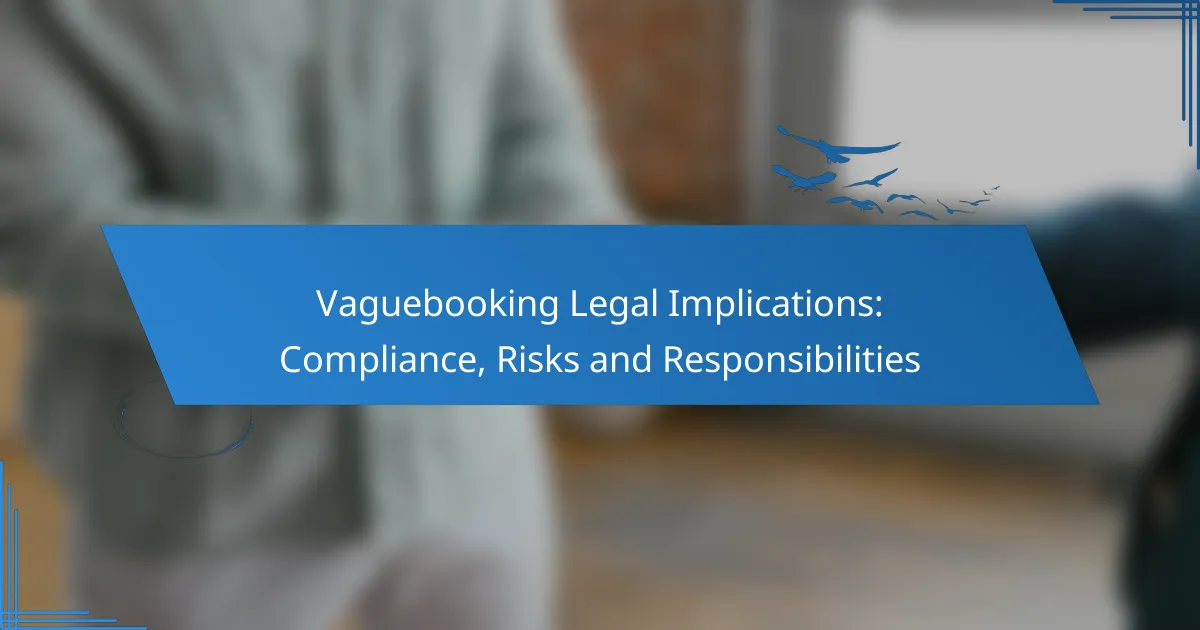Vaguebooking, the practice of posting ambiguous statements on social media, poses significant legal risks such as defamation, privacy violations, and potential employment repercussions in Canada. It is essential for users to understand these risks and comply with relevant privacy laws to navigate the complexities of online communication responsibly. Additionally, social media platforms play a crucial role in managing vaguebooking by enforcing content moderation and safeguarding user privacy, thereby fostering a balanced online environment.

What are the legal risks of vaguebooking in Canada?
Vaguebooking, or posting ambiguous statements on social media, can expose individuals in Canada to various legal risks, including defamation claims, privacy violations, and employment consequences. Understanding these risks is crucial for anyone using social media platforms.
Potential defamation claims
Vaguebooking can lead to defamation claims if a post implies false statements about another person that could harm their reputation. Even if the statement is not explicitly named, if it can be reasonably inferred who the subject is, the poster may face legal action.
To mitigate this risk, avoid posting ambiguous comments that could be interpreted as negative or damaging. If you feel compelled to share your thoughts, consider being more specific or using private channels to communicate your concerns.
Privacy violations
When vaguebooking, individuals may inadvertently disclose private information about themselves or others, leading to privacy violations. In Canada, privacy laws protect individuals from unauthorized sharing of personal data, and breaching these laws can result in legal consequences.
To protect privacy, think carefully about the content of your posts. Ensure that you are not revealing sensitive information or discussing others without their consent. If in doubt, it’s best to keep the information private.
Employment consequences
Vaguebooking can also have repercussions in the workplace, as employers may view ambiguous posts as unprofessional or damaging to the company’s reputation. This can lead to disciplinary actions or even termination, especially if the content is perceived as negative or critical of the employer.
To safeguard your employment, maintain professionalism in your social media presence. Avoid posting vague statements that could be interpreted negatively about your job or colleagues, and consider the potential impact of your online behavior on your career.
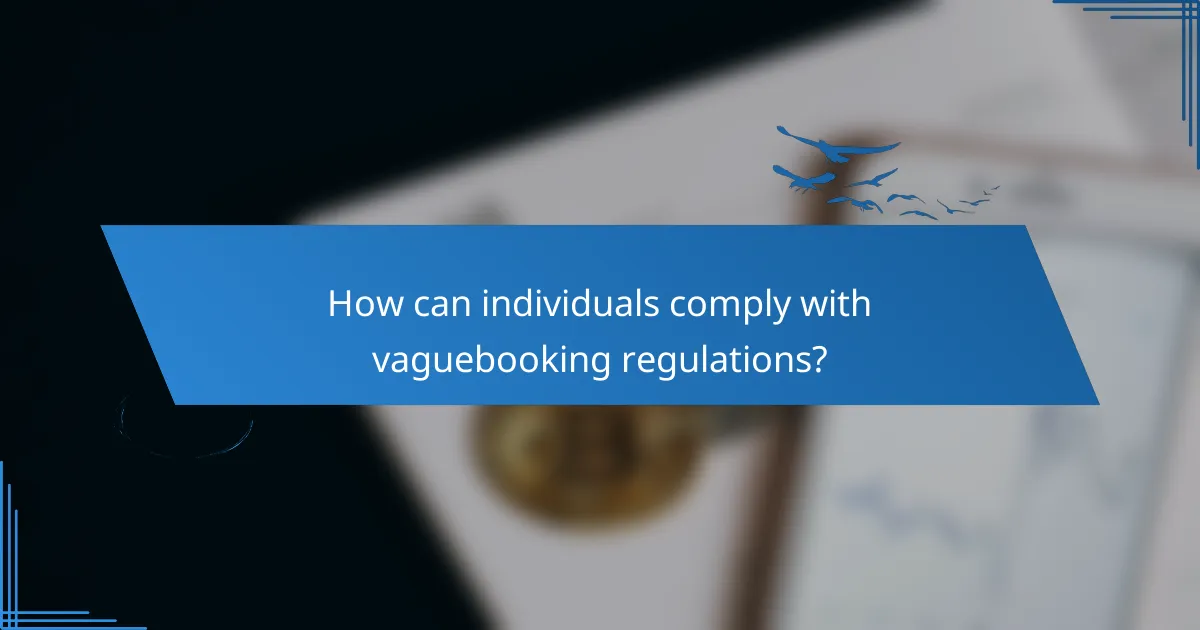
How can individuals comply with vaguebooking regulations?
Individuals can comply with vaguebooking regulations by understanding relevant privacy laws and implementing best practices for online communication. This involves being mindful of the content shared on social media and ensuring that it does not violate any legal standards or infringe on others’ rights.
Understanding privacy laws
Privacy laws vary by country and can significantly impact how individuals engage in vaguebooking. In the United States, for example, the Federal Trade Commission (FTC) enforces regulations that prevent misleading or deceptive practices online. In the European Union, the General Data Protection Regulation (GDPR) emphasizes user consent and data protection, which can affect how personal information is shared.
Individuals should familiarize themselves with applicable laws in their jurisdiction to avoid potential legal issues. This includes understanding what constitutes personal data and the rights individuals have regarding their information.
Implementing best practices
To minimize risks associated with vaguebooking, individuals should adopt best practices for online communication. This includes being clear and specific in posts to avoid misunderstandings and potential backlash. For instance, instead of posting ambiguous statements about personal issues, consider sharing thoughts in a more constructive and direct manner.
Additionally, individuals should regularly review their privacy settings on social media platforms to control who can see their posts. Limiting visibility to trusted friends or groups can help mitigate risks associated with vaguebooking while still allowing for personal expression.
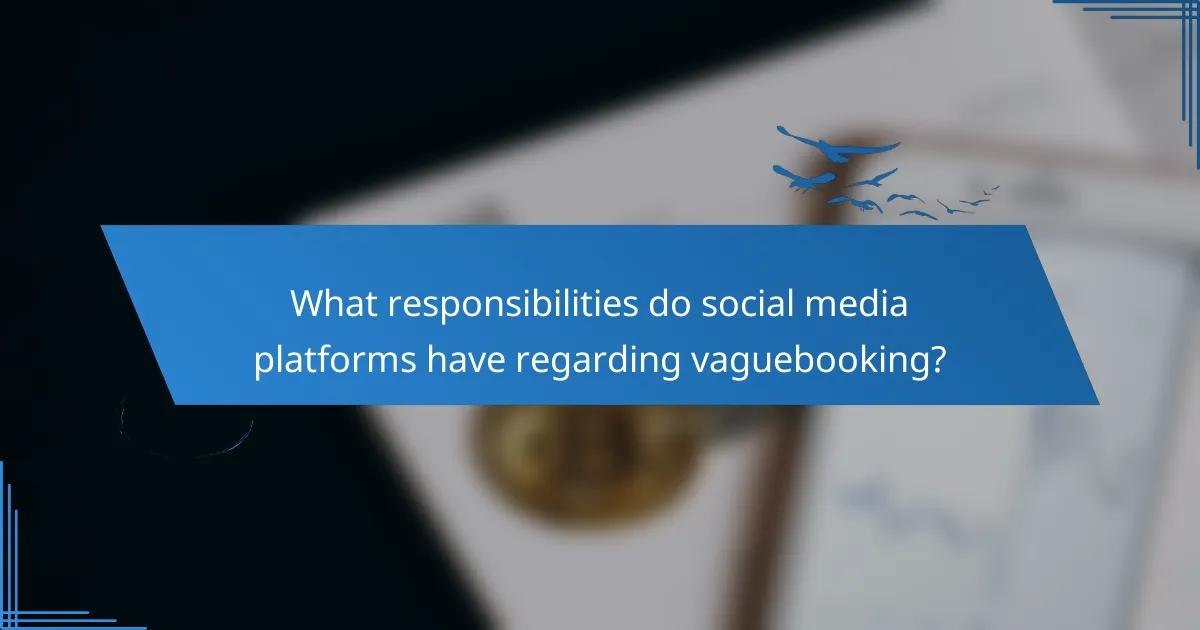
What responsibilities do social media platforms have regarding vaguebooking?
Social media platforms have a responsibility to manage vaguebooking by implementing effective content moderation and protecting user privacy. These responsibilities help ensure a safe online environment while balancing user expression and community standards.
Content moderation policies
Content moderation policies are essential for managing vaguebooking, as they help platforms identify and address ambiguous posts that may cause confusion or distress. These policies typically outline the types of content that are prohibited, including posts that could be interpreted as harmful or misleading.
Platforms often employ a combination of automated systems and human moderators to enforce these policies. For example, a post that hints at self-harm may trigger a review process, leading to potential intervention or support resources being offered to the user.
User privacy protections
User privacy protections are crucial when addressing vaguebooking, as platforms must ensure that users’ personal information is safeguarded while moderating content. This includes implementing measures to anonymize data and limit access to sensitive information during the moderation process.
Additionally, platforms should provide clear guidelines on how user data is handled, especially when vague posts may involve mental health issues or personal crises. Transparency in these practices can help build trust and encourage users to engage responsibly without fear of privacy violations.

How can businesses mitigate risks associated with vaguebooking?
Businesses can mitigate risks related to vaguebooking by establishing clear social media guidelines and providing training for employees on compliance. These proactive measures help ensure that communications are transparent and reduce the likelihood of misunderstandings or legal issues.
Developing social media guidelines
Creating comprehensive social media guidelines is essential for mitigating vaguebooking risks. These guidelines should clearly outline acceptable language, tone, and content to be shared on official channels. For example, businesses might specify that employees avoid ambiguous statements that could be misinterpreted or lead to speculation.
Additionally, guidelines should include examples of vaguebooking and the potential consequences, such as reputational damage or legal repercussions. Regularly reviewing and updating these guidelines will help keep them relevant and effective.
Training employees on compliance
Training employees on compliance with social media policies is crucial for minimizing vaguebooking risks. This training should cover the importance of clear communication and the potential legal implications of vague or misleading posts. Employees should understand how to express their thoughts clearly while adhering to company standards.
Consider implementing regular workshops or online courses that reinforce these concepts. Providing employees with scenarios and role-playing exercises can help them practice responding to situations that may lead to vaguebooking, ensuring they are prepared to communicate effectively.
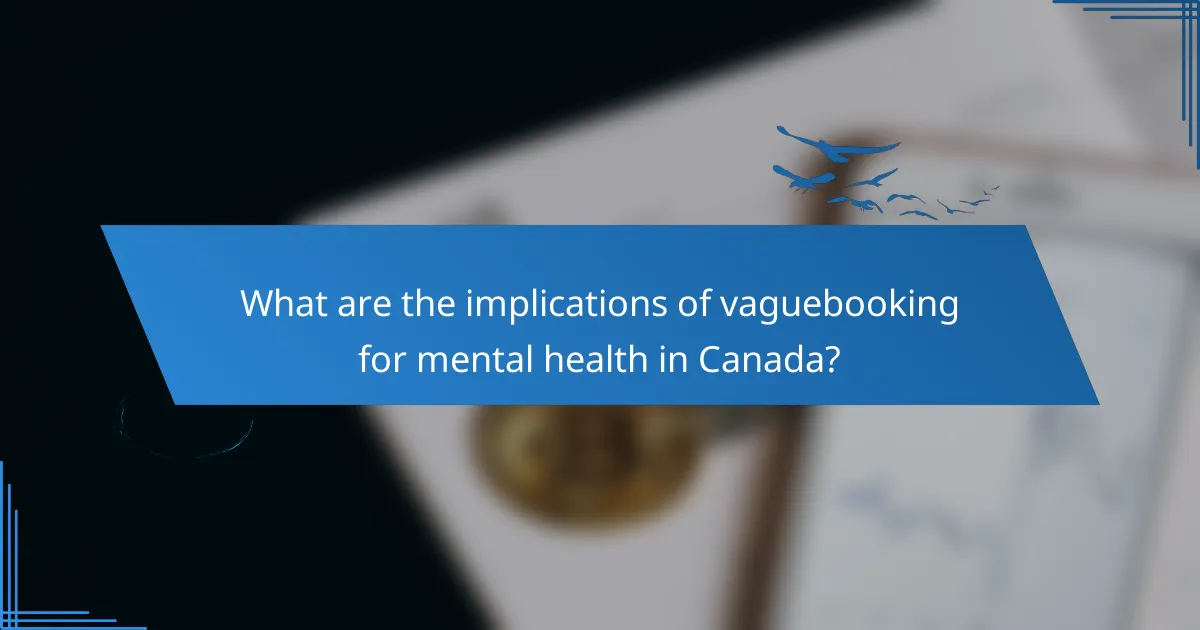
What are the implications of vaguebooking for mental health in Canada?
Vaguebooking, or posting ambiguous updates on social media, can significantly impact mental health in Canada by fostering feelings of anxiety and isolation. Individuals may experience increased stress due to the lack of clarity in these posts, leading to misunderstandings and emotional turmoil among friends and family.
Impact on personal relationships
Vaguebooking can strain personal relationships as friends and family may feel compelled to guess the underlying issues, leading to unnecessary tension. This ambiguity can create a cycle of miscommunication, where individuals misinterpret intentions and emotions, potentially resulting in conflicts.
For example, a post expressing frustration without context might prompt friends to worry or react defensively, which could escalate the situation. To maintain healthy relationships, it’s advisable to communicate openly rather than relying on vague social media updates.
Effects on workplace dynamics
In a workplace setting, vaguebooking can lead to misunderstandings among colleagues and supervisors, affecting team cohesion and morale. If an employee posts about feeling overwhelmed without specifics, it may cause concern or speculation among coworkers, which can disrupt productivity.
Employers should encourage clear communication and provide support for employees struggling with mental health issues. Establishing an open dialogue about workplace stressors can help mitigate the negative effects of vaguebooking and foster a supportive environment.
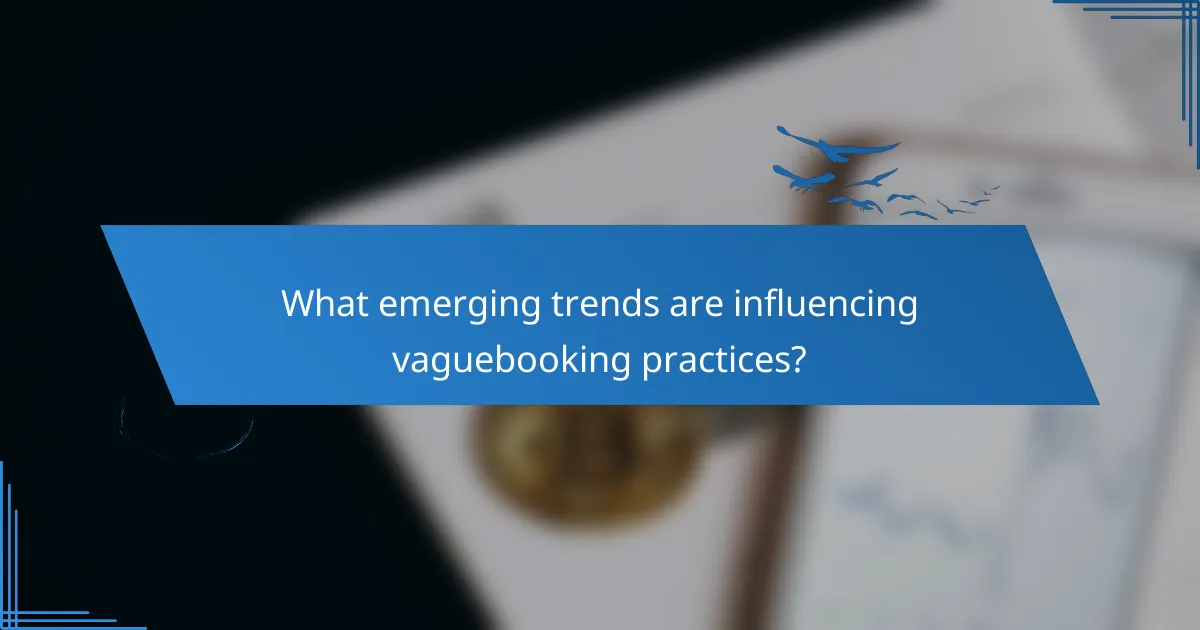
What emerging trends are influencing vaguebooking practices?
Emerging trends such as increased legal scrutiny, shifts in social media usage, and growing awareness of mental health issues are shaping vaguebooking practices. These factors influence how individuals express themselves online and the potential repercussions of ambiguous posts.
Increased legal scrutiny
Legal scrutiny surrounding vaguebooking is on the rise as courts and regulators examine the implications of ambiguous online statements. Individuals may face defamation claims or privacy violations if their vague posts are interpreted in harmful ways. It’s crucial to understand that even seemingly harmless comments can lead to legal challenges.
For example, a vague post about feeling betrayed could be construed as a personal attack on a specific individual, leading to potential legal action. Users should be cautious and consider the possible interpretations of their posts before sharing them.
Shifts in social media usage
Social media platforms are evolving, with users increasingly favoring visual content over text-based updates. This shift impacts vaguebooking, as users may opt for ambiguous images or memes instead of written posts. As a result, the interpretation of vague content can become even more subjective.
Moreover, the rise of ephemeral content, such as stories on Instagram or Snapchat, encourages users to share fleeting thoughts without context. This can lead to misunderstandings and misinterpretations, making it essential for users to think critically about their online presence.
Growing awareness of mental health issues
As awareness of mental health issues increases, vaguebooking often reflects individuals’ struggles with emotional well-being. Users may post ambiguous statements to seek support or express their feelings without disclosing specific details. This trend highlights the need for sensitivity and understanding in online interactions.
However, vague posts can sometimes lead to unintended consequences, such as friends or followers misinterpreting the intent behind the message. Users should consider being more transparent about their feelings or seeking direct communication to avoid confusion and foster genuine connections.
